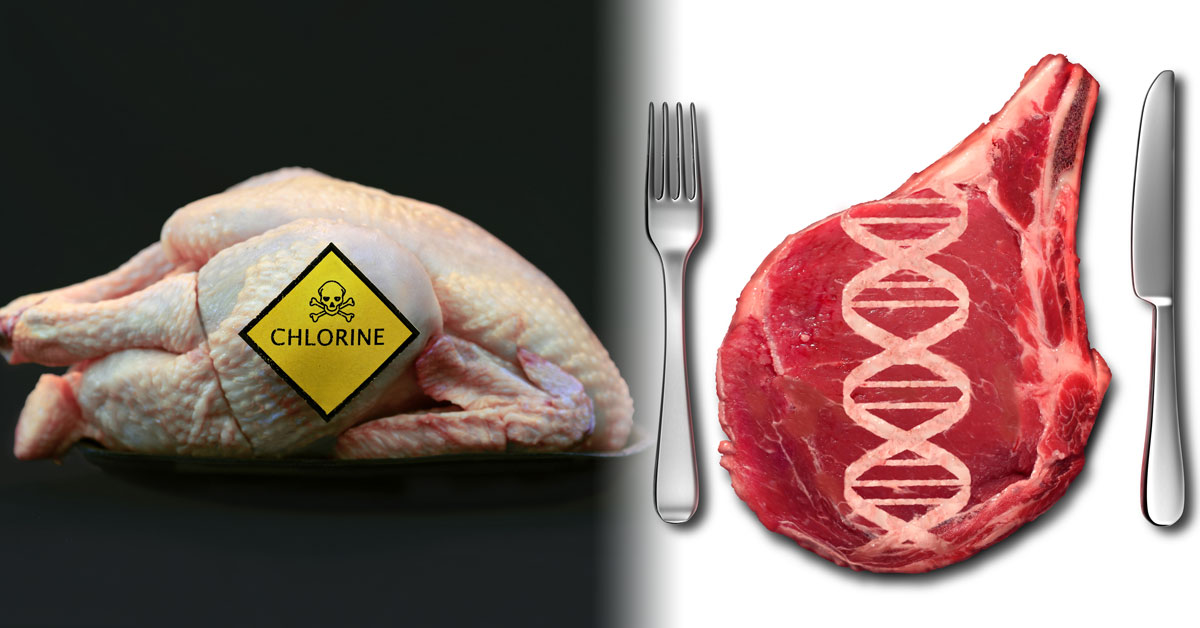
Even the Jamie Oliver-backed campaign Biteback2030 is avoiding the GM word – why?
In an article in the Guardian (below), National Farmers’ Union (NFU) president Minette Batters voices concern about the prospect of chlorinated chicken and hormone-fed beef coming into the UK following on from a UK-US trade deal.
But the NFU fails to mention another risky type of product – genetically modified (including gene-edited) foods. A UK-US trade deal could result in inadequately safety tested and unlabelled GMOs flooding into UK supermarkets. But not only does the NFU not care, it is set to support such an influx. It is an eager supporter of weakening regulations around the new GM technique of gene editing, based on evidence-free assumptions that gene editing will solve many problems in agriculture.
Biteback2030
Another powerful voice in the movement to maintain UK food and farming standards is the Biteback2030 campaign. It's fronted by the chef Jamie Oliver, who is perhaps the best known of its high-profile supporters. Jamie is rightly celebrated for his efforts in trying to encourage people, especially children, to eat more healthily.
He's also known for speaking out against GM foods. In his open letter to prime minister Boris Johnson, written back in May, Jamie lists "genetically modified food" as one of the types of low quality food that could flood into British supermarkets following a trade deal – along with hormone- and antibiotic-fed meat, produce sprayed with banned pesticides, and foods high in fat, salt and sugar.
Fast forward to this September and the new open letter from Jamie and co-signatories including the NFU and WWF lists the same food horrors, but with one glaring omission: genetically modified food.
Did Jamie have to avoid mentioning GM in order to get a "big tent" with the likes of the NFU and WWF?
WWF was a founder member of the Round Table on Responsible Soy, which notoriously certified Monsanto's glyphosate herbicide-drenched Roundup Ready GM soy as "responsible".
There's no doubt that chlorinated chicken, meat raised with hormones and antibiotics, and produce grown with dangerous pesticides are unacceptable and no one should be eating them. But poorly tested and unlabelled gene-edited foods are equally risky. It's time that Biteback2030, the NFU and the WWF woke up to the science and at the very least, addressed this crucial issue that has far-reaching implications for the future of food and agriculture in the UK.
The combination, on the one hand, of the UK government's obsession with deregulating gene editing and, on the other, the total silence on GMOs of the strongest voices in the campaign to protect our food and farming standards, looks set to lead to a very dangerous situation, in which the UK government actually feels empowered to throw concerns about GMOs under the bus in exchange for maintaining protections against the issues that are grabbing all the headlines: chlorinated chicken, hormone-fed meat, and so on.
If you're in the UK and concerned about this prospect, please write to your MP and let them know that you want to at least maintain the current EU regulatory standards for all GMOs, including gene-edited ones, and that current loopholes in GMO regulations should be closed.
---
Farmers call on UK to commit in law to ban chlorinated chicken
Lisa O'Carroll, Brexit correspondent
The Guardian, 4 Oct 2020
https://www.theguardian.com/politics/2020/oct/04/farmers-call-on-uk-government-ban-chlorinated-chicken
* Government must ‘put down a red line’ in the agriculture bill, says NFU president
The National Farmers’ Union (NFU) has called on the UK government to make a legal commitment to ban chlorinated chicken and hormone-fed beef from supermarket shelves.
In advance of new agriculture legislation, the NFU president, Minette Batters, said she was not demanding that imported chickens should luxuriate in “10ft-high straw beds” but that the UK’s high standards of animal welfare should be imposed on imports.
“We’ve had so much talk about chlorinated chicken. The thing is, if we don’t put a marker in the sand, if government doesn’t put a red line down in the agricultural bill, that allows secondary legislation on any day of the week effectively to change it. You have to put that marker down and say: ‘No, you know, we’re going to stick by our word today,’” she said.
In an exchange with the international trade secretary, Liz Truss, at the Conservative party conference, Batters called on the government to support the Curry amendment to the agriculture bill, which returns to the House of Commons on 12 October.
Lord Curry’s amendment is designed to give the recently assembled trade and agriculture commission (TAC) a stronger role in scrutinising trade deals.
Truss came under repeated fire over the lack of perceived scrutiny in parliament for trade deals from the government’s food tsar, Henry Dimbleby, who called for full parliamentary scrutiny, including evidence and witness accounts to select committees of all post-Brexit trade deals.
He has also called on Truss to put a health expert on the TAC before the nation’s bus stops and billboard are “covered in ads for Hershey bars”. “Our diets are already one of the worst in the world, and we do not want to make it any worse,” he said.
Truss rejected the accusation of secrecy and said all signed trade deals would go before an independent trade commission chaired by the SNP’s Angus Brendan MacNeil, who was not a “government patsy”.
They would also be subject to an impact assessment process to analyse economic and social consequences, and their report would go before parliament and be debated. Under the so-called Crag process it could be blocked indefinitely if there were an objection.
She also said industry players would be consulted in confidence on key elements of trade deals. The tariff offer from the US was about to be shared with “trusted” advisory groups from 11 sectors under non-disclosure agreements.